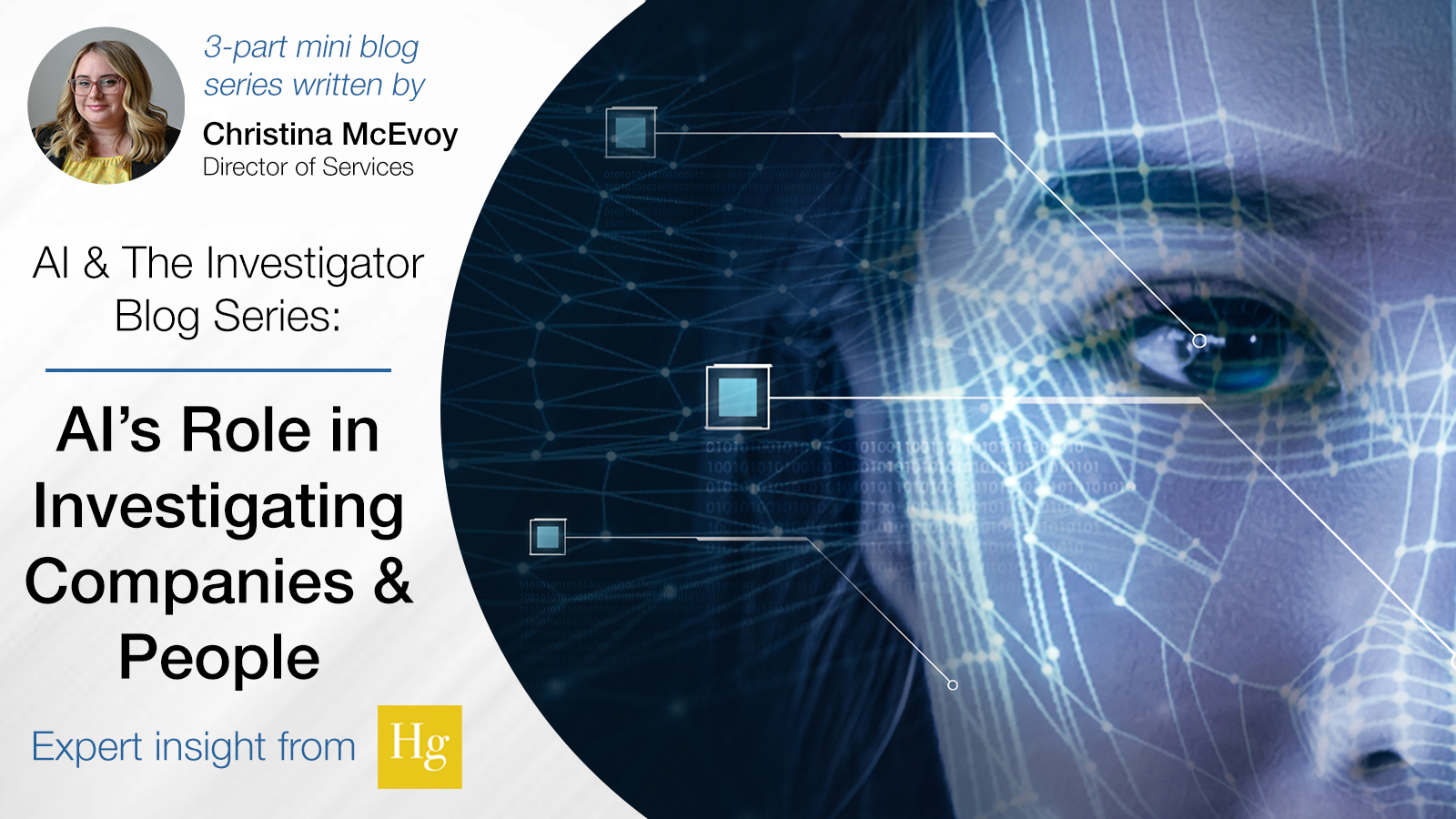AI’s Role in Investigating Companies & People
January 16, 2024 | by Christina McEvoy
This is part 1 our 3-part mini-blog series.
 In nearly every OSINT investigation, the client’s objective is to perform some kind of due diligence that will detect threats, mitigate risk, and enable clear decision-making. Decades ago, being a private investigator was extremely laborious and often required extensive travel and tedious manual labor to scour public records at government offices, verify property locations in person and physically follow a subject to report on the activities of the party being investigated. Today, artificial intelligence (AI) has enabled investigators to work more quickly and accurately, eliminating much of the manual labor required and in many cases, reducing the need for extensive travel and having “boots on the ground” in various locales.
In nearly every OSINT investigation, the client’s objective is to perform some kind of due diligence that will detect threats, mitigate risk, and enable clear decision-making. Decades ago, being a private investigator was extremely laborious and often required extensive travel and tedious manual labor to scour public records at government offices, verify property locations in person and physically follow a subject to report on the activities of the party being investigated. Today, artificial intelligence (AI) has enabled investigators to work more quickly and accurately, eliminating much of the manual labor required and in many cases, reducing the need for extensive travel and having “boots on the ground” in various locales.
The need for corporations, government agencies and other organizations to have accurate and current intelligence on the entities with which they engage and conduct business with, as well as the people they recruit and retain as employees, remains essential. With technology accelerating the pace of business ever faster, the requirement for sound due diligence is paramount…and continuous. Further, in the present business climate, every kind of organization is a participant in the global economy whether by design or by default, stretching the capabilities of investigators to nimbly execute their investigations on an international plane, even from their desks thousands of miles away.
Just how can investigators take on increasingly complex assignments for major clients such as global enterprises that dictate the world economy? AI tools offer the answer. While AI is nothing new to the investigations profession though it is presently groundbreaking for other industries, the AI tools investigators use are rapidly evolving and increasingly essential in tackling challenging assignments that involve gleaning data from all over the world and in the deepest corners of the internet.
Today’s investigators have AI tools at the literal tips of their fingers that enable combing through years of social media posts at lightning speed to uncover a single data point, matching photos with addresses, cracking into international registries to confirm the legitimacy of foreign businesses and accessing criminal records.
As enterprises are continuously dependent on international vendors and logistics partners in conducting day-to-day business operations, due diligence is not a one and done process. It is a constant need that requires regular — in some cases daily — monitoring of the supply chain, executive relationships and the actions and affiliations of employees for which AI can help.
Many enterprises wisely maintain contracts with private investigators to conduct regular due diligence on the companies with which they do business, as well as new hires and existing employees since all of the above have the potential to affect the security of an enterprise. For many companies, an ongoing due diligence process is a sound business investment that reduces risk and heightens confidence in engagement with other organizations. For others, due diligence is a mandatory requirement. For instance, if a third-party vendor shares confidential customer information with a foreign entity that ends up experiencing a data breach, significant financial and reputational damage can result, to say nothing of legal liability. In fact, the U.S. Securities and Exchange Commission now has a new rule requiring companies to disclose such incidences as they affect investors.
For others, staying on top of risk and reputational concerns is an underlying part of their ESG program: knowing the environmental, social and governance impacts of the parties with whom they engage in commerce is an intrinsic part of their mission. Further, corporate ESG reporting is increasingly mandated by governments including the United States, United Kingdom, Singapore, Hong Kong and various European Union countries.
Part Two of this blog series will dive into the most critical types of AI tools to help the investigator with initial and ongoing due diligence investigations.



